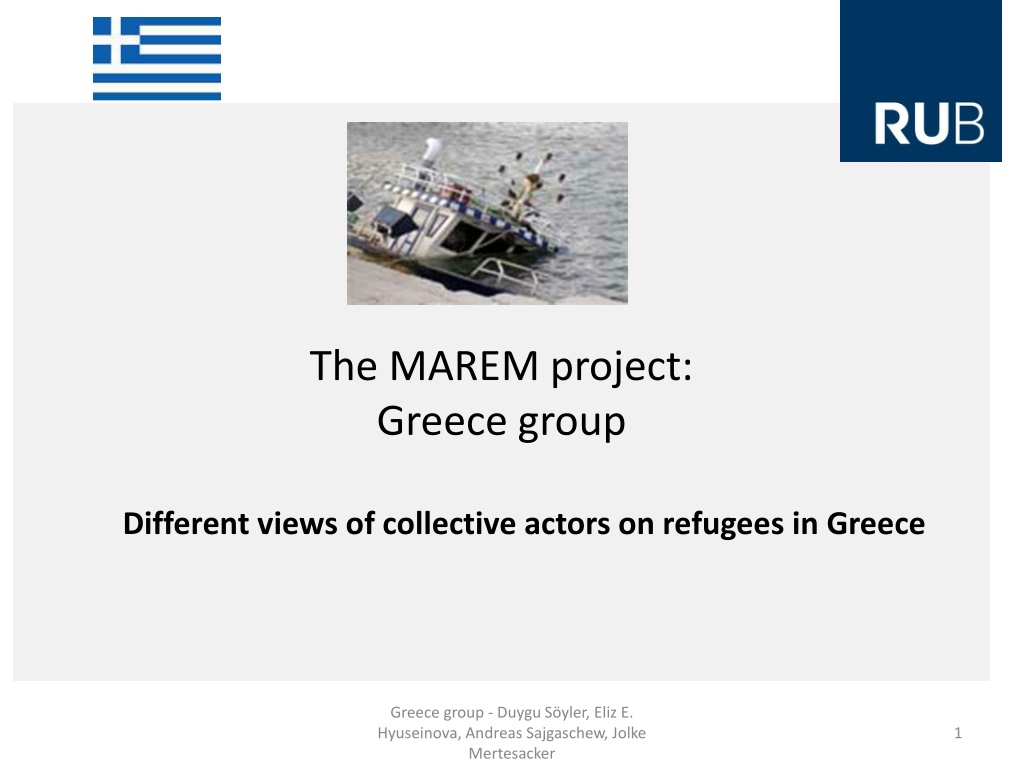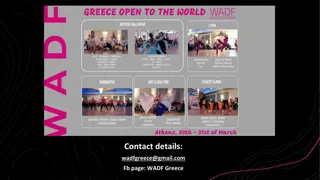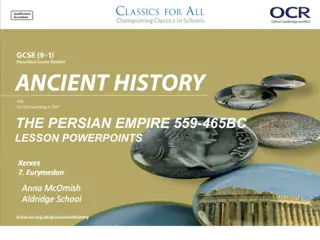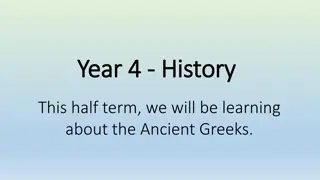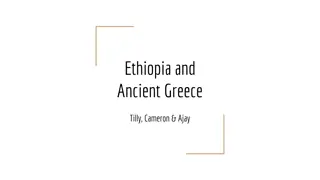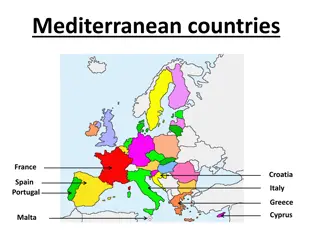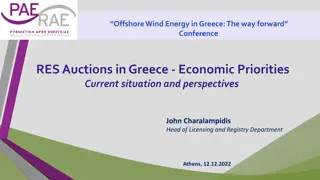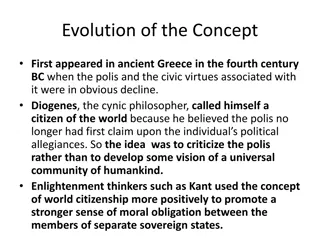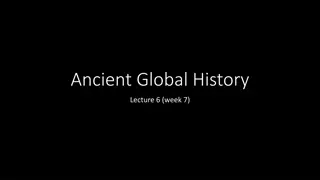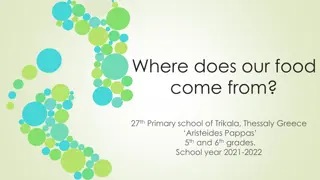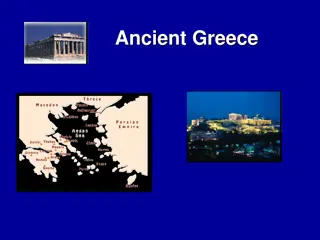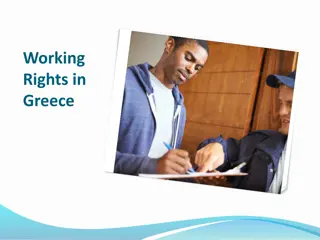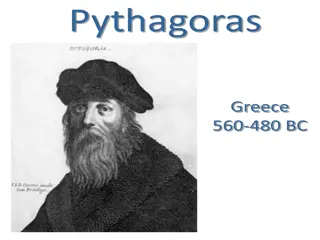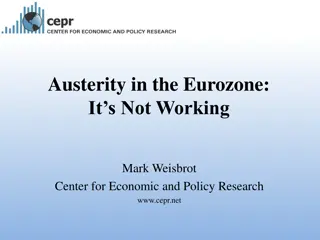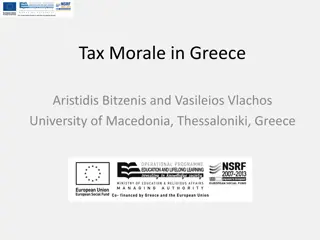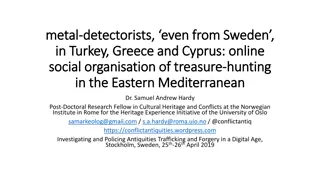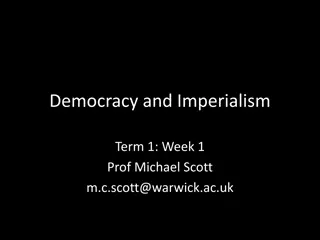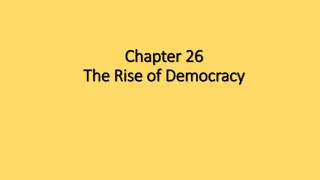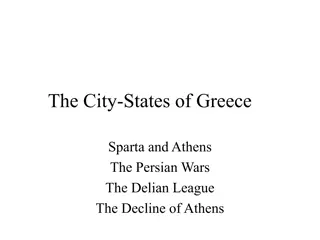Different Views of Collective Actors on Refugees in Greece
The MAREM project by a Greece group explores the diverse perspectives of collective actors on refugees in Greece, addressing migration policies, asylum services, and the situation of refugees in the country. With a focus on expert interviews and research results, the project delves into the complexities surrounding refugee welfare and policies in Greece.
Uploaded on Dec 13, 2024 | 0 Views
Download Presentation

Please find below an Image/Link to download the presentation.
The content on the website is provided AS IS for your information and personal use only. It may not be sold, licensed, or shared on other websites without obtaining consent from the author. Download presentation by click this link. If you encounter any issues during the download, it is possible that the publisher has removed the file from their server.
E N D
Presentation Transcript
The MAREM project: Greece group Different views of collective actors on refugees in Greece Greece group - Duygu S yler, Eliz E. Hyuseinova, Andreas Sajgaschew, Jolke Mertesacker 1
Table of content 1. Introduction 2. Research Question 3. State of the art 4. Data 5. Research Results 6. Conclusion 7. References Greece group - Duygu S yler, Eliz E. Hyuseinova, Andreas Sajgaschew, Jolke Mertesacker 2
Introduction Population: about 11 Mio. Area: about 132.000 km Unemployment rate: 27,3 % (2013) History of migration: With the collapse of the Soviet Union Greece became a receiving country for many people from the East. It is considered as the eastern gate of Europe. Government: President of Greece : Karolos Papoulias ( Panhellenic Socialist Movement) ( since 2005) Prime Minister: Antonis Samaras ( New Democracy) (since 2012) Greece group - Duygu S yler, Eliz E. Hyuseinova, Andreas Sajgaschew, Jolke Mertesacker 3
Introduction National migration policy: Greek migration policy is conform to EU guidlines. Up to 2010 the procedure has been regulated by Presidential Decrees. And since 2011 there is a new law ( law 3907 ) assigning the creation of 13 Asylum Services Asylum and new asylum applicants: 8.225 (2013) Final descisions on applications (2013) : Total number of decisions: 3900 Rejected: 2990 Total positive decisions: 910 Most important countries of origin: Afghanistan, Syria, Iran, Iraq, Somalia, Eritrea, Congo, Pakistan, Bangladesh Greece group - Duygu S yler, Eliz E. Hyuseinova, Andreas Sajgaschew, Jolke Mertesacker 4
Research Question How do the views of the different types of organizations differ from each other concerning the situation of refugees in Greece ? Greece group - Duygu S yler, Eliz E. Hyuseinova, Andreas Sajgaschew, Jolke Mertesacker 5
State of the art 1. Why Greece is not a Safe Host Country for Refugees - Achilles Skordas and Nicholas Sitaropoulos, Journal of Refugee Studies (2005) 18 (3): 299-318. 2. Modern Greek Asylum Policy and Practice in the Context of the Relevant European Developments Nicholas Sitaropoulos, Journal of Refugee Studies (2000) 13 (1): 105-117. 3. Refugee welfare in Greece: towards a remodeling of the responsibility- shifting paradigm? Nicholas Sitaropoulos, Critical Social Policy (2002) 22 (3): 436-455. Greece group - Duygu S yler, Eliz E. Hyuseinova, Andreas Sajgaschew, Jolke Mertesacker 6
Data Expert Interviews with 5 NGO s (Aitima, Hellenic Migration Policy Institute (IMEPO), Amnesty International, Ecumenical refugee program (ERP), Social Center) Expert Interview with one police man Expert Interview with an university professor Expert Interview with a social organisation (Afghan Community) Narrative interviews with two refugees in Athens Greece group - Duygu S yler, Eliz E. Hyuseinova, Andreas Sajgaschew, Jolke Mertesacker 7
Data Organization Norms/values (religious, political, human rights etc.) Dominant issue (only on A&R or multiple) Field of legitimation (regional, local, national, EU, global) Internal/balanced /external logics (resources) Characteristics Actor types Official- executive actors Police Protection of the order in the state multiple national external A&R-related NGOs Aitima ERP Social Center Afghan Community Amnesty International Support Religious Political/support Support multiple A&R multiple multiple regional national regional regional external external internal Internal human rights multiple global balanced Scientific organizations IMEPO (first governmental, now NGO) Scientific multiple national balanced Greece group - Duygu S yler, Eliz E. Hyuseinova, Andreas Sajgaschew, Jolke Mertesacker 8
Research question How do the views of the different types of organizations differ from each other concerning the situation of refugees in Greece ? Greece group - Duygu S yler, Eliz E. Hyuseinova, Andreas Sajgaschew, Jolke Mertesacker 9
Research results IMEPO: You know the law from the EU says that we can not keep them even if we can. Only for 1 year and a half, not more ( ) so it is also not possible to sent these people back to their countries. This problem belongs to the EU, because you have to keep your borders safe, but how is it possible to do that. If we try to stop them outside our borders, then we have a problem with the Geneva Refugees. We have to give them the right to enter in our country, to seek asylum, to examine if they have the right to take the refugee status or not, and then to send them back. But if they are already in the country it is impossible for us to send them back so they stay here. First, to stop the new incomers, second- to try to help the people who are already here, maybe also share them with the other European countries, of course based on the economical situation and the total population of each country, and help them to become legal, and third one- to change some of the law and the policy about the migration issues. We have to accept that the EU are not 27 separated countries, but that we are together with this problem. Greece group - Duygu S yler, Eliz E. Hyuseinova, Andreas Sajgaschew, Jolke Mertesacker 10
Research results: IMEPO: IMEPO suggests to close all borders, but gives the responsibility to the European Union. This organization appoints to the legal procedure of taking refugees and asylum seekers. A bureaucratic solution with a procedure which sends people after a while back. IMEPO appoints on a change in the European and national laws of migrants. Burden sharing: We have to accept that the EU is not 27 separated countries, but that we are together in this problem. Rational and mathematical solution for burden sharing because of the comparison of the economical status of each European Country. (The states with high welfare should take more refugees and asylum seekers than e.g. Greece.) Greece group - Duygu S yler, Eliz E. Hyuseinova, Andreas Sajgaschew, Jolke Mertesacker 11
Research results Amnesty International : We have to understand that people and government, that migration does happen and there is no way to stop it. We need to approve the human rights . [ ] The other problem is the access to asylum, it doesn't exist. The process is too long, they do not have access to lawyers and translators, across Europe. Amnesty Internationals focus is on human rights and from their perspective the asylum procedure is unfair The work of Amnesty International is more depended on the governmental level Amnesty International Greece said, that they get many calls from detention centers because of conditions there Greece group - Duygu S yler, Eliz E. Hyuseinova, Andreas Sajgaschew, Jolke Mertesacker 12
Research results Social Center: It's the way, they do not want to stop the problem, they need to keep a balance, a balance means, if they want to solve the problems. [ ] first they need to stop giving money for this detention centers. Because, why they give this? Because the European Countries get preferred with this situation. [ ] it's the aim, to not let the people come to the rest of Europe. For this they created Schengen, Dublin 1,2 &3, [ ] it is easier to come from Turkey to Greece, than from Greece to Italy. Associated with the left-wing political background of this situation, the Social Center explains that this system works because of the bureaucratic barrier which was made by the Dublin conventions and Schengen, about asylum seekers and refugees from the (economic) wealth in the Northern European Countries The situation in the detention centers is for the Social Center the most important issue Greece group - Duygu S yler, Eliz E. Hyuseinova, Andreas Sajgaschew, Jolke Mertesacker 13
Research results Aitima: Europe should create a system which provides for fair distribution of people [ ]because now there is a law saying that if Greece people can do the same job asylum seekers cannot get a working permit. So on the one hand they don t get any benefit and on the other they cannot work[ ] Also explaining the problem of the access to the labour market for refugees and asylum seekers, of course associated with the situation after the economic collapse in Greece in 2009 Government does not pay for the asylum seekers and refugees, also no access to the labour market. Greece group - Duygu S yler, Eliz E. Hyuseinova, Andreas Sajgaschew, Jolke Mertesacker 14
Conclusion Similarities: - Opinion: The situation of the refugees in Greece is relative bad - Explanation: Lack of (financial) governmental support and unavailability of work permit - Solution: Fair-minded allocation of asylum seekers in whole Europe Greece group - Duygu S yler, Eliz E. Hyuseinova, Andreas Sajgaschew, Jolke Mertesacker 15
Conclusion Differences: IMEPO: Supporting the idea of closing the borders. Bureaucratic solution for this problem. Demands a change in laws (for more regulated asylum procedure). Amnesty International: Working on governmental level with a appeal to the human rights Social Center: Radical criticism on the Dublin Convention, the Schengen- area and the laws made by European Union. Aitima: Supports a fair distribution of asylum seekers and refugees. Also criticizes the detention centers. European Union should change the system. Greece group - Duygu S yler, Eliz E. Hyuseinova, Andreas Sajgaschew, Jolke Mertesacker 16
Conclusion All NGOs and interview partners explained, that this is not a Greek problem but an European problem. All interview partners have an opinion, that Dublin 1,2,3 is not ensuring a fair procedure of taking asylum seekers and refugees. They feel forsaken by the European Union in how to deal with the migration of asylum seekers and refugees. IMEPO was the only organization which defines this problem on economics and statistics. The other organizations refer to a solution which includes regard for human rights and a direct appeal to stop this systematic detention of people. Greece group - Duygu S yler, Eliz E. Hyuseinova, Andreas Sajgaschew, Jolke Mertesacker 17
References Achilles Skordas and Nicholas Sitaropoulos, 2005: Why Greece is not a Safe Host Country for Refugees. In: Journal of Refugee Studies Volume 18, Number 3, pp. 299-318. European Migration Network Country overview Greece http://ec.europa.eu/dgs/home-affairs/what-we- do/networks/european_migration_network/index_en.htm (25.06.2014) Eurostat http://epp.eurostat.ec.europa.eu/portal/page/portal/eurostat/home/ (25.06.2014) Nicholas Sitaropoulos, 2002: Refugee welfare in Greece: towards a remodeling of the responsibility-shifting paradigm?. In: Critical Social Policy, Volume 22, Number 3, pp. 436-455. Nicholas Sitaropoulos, 2000: Modern Greek Asylum Policy and Practice in the Context of the Relevant European Developments. In: Journal of Refugee Studies, Volume 13, Number 1, pp. 105-117. UNHCR official website http://www.unhcr.org/cgi-bin/texis/vtx/home (25.06.2014) Greece group - Duygu S yler, Eliz E. Hyuseinova, Andreas Sajgaschew, Jolke Mertesacker 18
Greece group - Duygu Syler, Eliz E. Hyuseinova, Andreas Sajgaschew, Jolke Mertesacker 19
